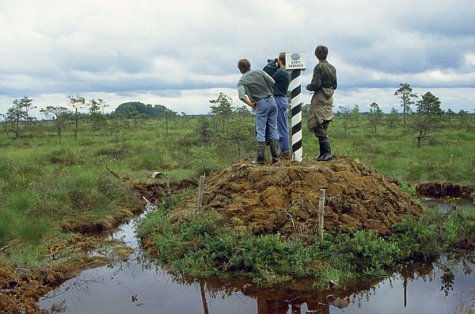Voluntary project workers looking for helping hands
Estonian Fund for Nature (Eestimaa Looduse Fond, ELF) announces that the first voluntary work project of this summer period takes place on the outskirts of the North-Livonian marshlands. The work consists of building dams in the old drainage ditches in order to re-establish the bog.
Agu Leivits, senior specialist on nature conservation at the Environmental Board says: "In Estonia most bogs are in a retaining ring of drainage ditches. Many bog verge biotopes have been impoverished or destroyed by the drainage and the verge drainage also damages the bogs themselves. In the wetlands of North Livonia work has started to investigate and find ways to reconstitute the biotopes and the hydrological status in bogs. There are several ways of constructing dams for the ditches, the most environmentally economical is to build with peat with a low degree of humidification from the bog itself. The peat dams also have a long lifetime since they contain no wooden parts likely to rot. Such a dam is 100% natural; no artificial materials need to be transported to the bog. But since the building of the dams in these places is purely manual work, help from voluntary workers is essential.”
Last summer the ELF voluntary workers constructed five experimental peat dams at the borders of the Ruunasoo bog in the Sookuninga nature reserve. Performance monitoring is an important aspect of the reconstitution project. It is now evident that the dams have performed excellently, have survived even the spring-time high waters, and the construction work can go on.
Marshes were drained during the Soviet period typically for two purposes: to produce peat or to boost forest growth. Gradually it became clear that the draining of bogs for forest economy purposes is not profitable, but many natural habitats have already been damaged from the direct or indirect effects of the drainage. Simultaneously a number of problems have come up in the damaged bogs, such as an extremely high risk of fires in summer. Nearly all Estonia’s major forest fires have been in drained peat areas where the fires are extremely difficult to extinguish due to the highly humificated peat.
The North Livonian wetland complex includes three internationally important RAMSAR wetlands: Nigula, Ziemelu Purvi (Northern Bogs) and the bogs in the Sookuninga nature reserve. The ELF voluntary work in North Livonia takes place on July 1 – 4.
Those wishing to take part in the work can register until June 25 at: www.talgud.ee.
Tarmo Tüür
ELF Voluntary Work Project Leader
SA Eestimaa Looduse Fond
+372 53411020
Agu Leivits
Senior specialist, Nature protection
Environmental Board
+372 5101175









